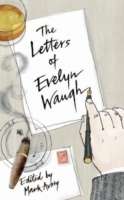Letters of Evelyn Waugh

Resumen del libro
Evelyn Waugh was the last of the great letter-writers, and his witty, elegant correspondence to a wide circle of friends contains more than a touch of malice. In the 1920s Waugh wrote to a schoolfriend about his undergraduate escapades at Oxford and the Harold Acton and Henry Green of his unhappy jobs, his literary plans and the break-up of his first marriage. In the 1930s his boisterous letters recount his successes, social life and travels in South America.
During the war, writing to his second wife, Laura Herbert, he revealed the strength of his love for her more vividly than has appeared elsewhere. He was inspired by Ann Fleming, Lady Diana Cooper and Nancy Mitford. Politics are rarely mentioned and he discusses writing only with someone he recognises as an equal, like Graham Greene.
His deeply felt religious beliefs are expressed to John Betjeman. But Waugh's main concern is to amuse - and in this he is triumphantly successful.
Biografía del autor
p b Evelyn Waugh /b nació en Londres en 1903. Estudió en Oxford y con veintisiete años se convirtió a la fe católica. Viajó como corresponsal a diferentes países de África y Sudamérica, y durante la Segunda Guerra Mundial sirvió en el Cuerpo Real de Marines y en la Royal Horse Guard, experiencia que inspiraría su trilogía i Espada de honor /i (1952-1961, de próxima publicación en Impedimenta). Entre sus novelas cabe destacar b i Un puñado de polvo /i /b (1931), i ¡Noticia bomba! /i (1938) y i Los seres queridos /i (1948). En 1945, con la publicación de i Retorno a Brideshead /i , dio comienzo su periodo de mayor éxito, durante la que publicaría la novela semiautobiográfida i La odisea de Gilbert Pinfold /i (1957; próximamente en Impedimenta). Falleció en 1966 en Combe Florey, en Somerset.<br>








